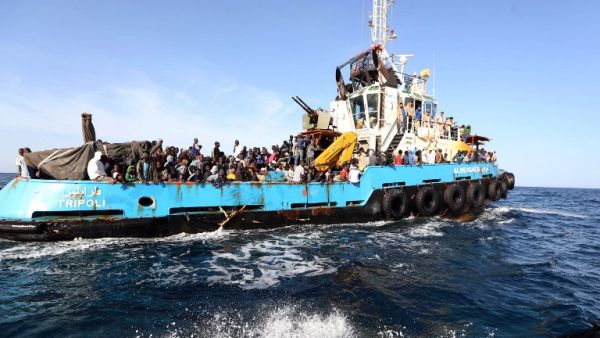EU leaders agreed on a plan to stem the flow of migrants via the Mediterranean at a summit in Malta Friday, yet their remarks inevitably circled back to the elephant in the room - US President Donald Trump.
The summit comes as the European Union finds itself under pressure not only from within over migration and Britain's intention to leave; the bloc's relationship has also become increasingly complicated with long-term ally the United States.
Europe must clearly define its role in the world in response to Trump's actions, German Chancellor Angela Merkel told reporters on the sidelines of the summit.
"Europe holds its fate in its own hands," Merkel said.
Austrian Chancellor Christian Kern criticized Trump's travel ban and suspension of refugee admissions, arguing that US foreign policy had contributed to high immigration.
"It is undoubtable that America has a shared responsibility for the flow of migrants through the way military intervention was carried out," Kern said, without specifying any country in which such actions were taken.
"It is unacceptable for the international community if America wants to avoid all responsibility. And we must make this clear to our American friends."
Jean-Claude Juncker, president of the European Commission, suggested that Trump's administration simply did not understand the EU.
"I do think that there is room for explanation, because sometimes I have the impression that the new administration does not know the European Union in detail – but in Europe, details matter," Juncker said.
Hollande, Merkel and British Prime Minister Theresa May were set to brief EU leaders on their discussions with Trump. Hollande and Merkel had phone conversations with the new US president, while May visited him in Washington last week.
May was set to tell her EU counterparts that Trump gave her a "guarantee that he was 100 per cent supportive of NATO," British officials said on Thursday.
The US president had previously questioned the alliance's effectiveness.
However, French President Francois Hollande warned Friday against relying solely on the US-dominated alliance for Europe's military defence.
"Who knows that the American president really wants with regard to the transatlantic alliance and burden sharing?" Hollande said.
While Trump may have stolen some of the spotlight, the leaders showed unity by passing a 10-point programme to stem the flow of migrants to Europe via the Mediterranean.
An estimated 180,000 people set out to reach Europe from North Africa in 2016, 4,500 of whom did not survive the journey.
The plan includes stepping up assistance for Libyan authorities, especially the Libyan coastguard, to stop migrant boats in the country's territorial waters and providing support for setting up safe refugee camps in the country.
The EU will also support voluntary repatriation for refugees willing to return to their countries of origin and work with countries neighboring Libya to better control the waters.
"The situation for migrants is dramatic in Libya," Merkel said before the meeting.
All 28 members of the EU were represented at the session on migration.
Italian Prime Minister Paolo Gentiloni and his Libyan counterpart Fayez al-Sarraj signed a memorandum of understanding aimed at curbing illegal migration across the Mediterranean late Thursday in Rome.
Italy is a key entry point for migrants striving to reach Europe.
The memorandum says the two countries will work to strengthen Libyan institutions, including the coastguard and border patrol.
The EU plan underlines political support for Italy's agreement with Libya.
On Friday afternoon, 27 heads of state and government will hold talks focusing on the bloc's future after a so-called Brexit. Britain's May will not be present.
By Emoke Bebiak








